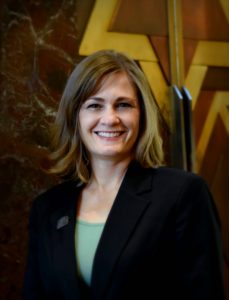by Vered Harris
The last week of May I traveled to Bratislava, Slovakia on a “family roots” trip. At the time of this writing, I haven’t yet left Oklahoma. By the time this is sent out, I’ll be home. In between, I am going to see the city of my paternal grandmother’s birth and the place she fled in 1939, at the age of 17.
After my grandmother fled with the virtual stranger who would become her husband and my grandfather, her parents remained in their home until the last six months of the war. Her father, Ferdinand, had been forced to sell his business to one of his non-Jewish employees. Ferdinand was then employed to ensure that the business continued to operate efficiently, until the last roundup of Jewish people in Bratislava was imminent. My great-grandparents took a late-night train to the family farm of one of their friends. There, the friend’s parents hid Ferdinand and Sylvia in a hole beneath the floor in the barn. At the end of the war Ferdinand and Sylvia returned to their home in Bratislava and tried to reestablish their life. Ultimately they left community Czechoslovakia and lived near my grandmother in Haifa, Israel.
I will travel with my three daughters, ages 23, 21, and 14, and with my father. For many years my father has wanted to find descendants of the people who hid and saved his grandparents from the Nazis. I hope that being on the ground there will help him to find some leads, but based on the dead end searches on the internet, I am skeptical. I have other goals for going. I want my daughters to feel connected to our family history. I want my father to return with me to a city he last visited in the 1990s with my grandmother (of blessed memory). I want to hear more of his memories of my great-grandparents. My father was unique in Israel in the 1950s and 1960s; very few of his friends had grandparents who had survived the Holocaust and lived near them. I remember Ferdinand from my own childhood, as he lived until I was 10. He did not speak English and I did not speak German or Hebrew or any of the other languages he knew. He communicated his love through chocolate. Milka bars, to be exact, which he kept in a credenza in his room in my grandmother’s home.
How does this relate to Rotary? We all have stories. We all have experiences that hurt our souls, that teach us resilience, that form who we strive to become. The couple who saved my great-grandparents were heroes. I see the Rotary Four-Way Test in their actions. The hate of their times was not the truth, so they rejected it. The round-up of the Jewish people was not fair, so they did what they could to intervene for at least one family. Their actions built goodwill for generations after their actions, and I hope that I am a better and more loyal friend as part of their legacy. Their actions were not beneficial for all concerned, because they could not help every Jewish person in Slovakia. But certainly their courage, their willingness to go against the law to do what was morally good, has proven to be beneficial in ways they could not imagine: it inspires those who know the story, it speaks to the good that is in the human spirit, and it affirms that even in the deepest holes and darkest of times there is hope in the goodness of people.

